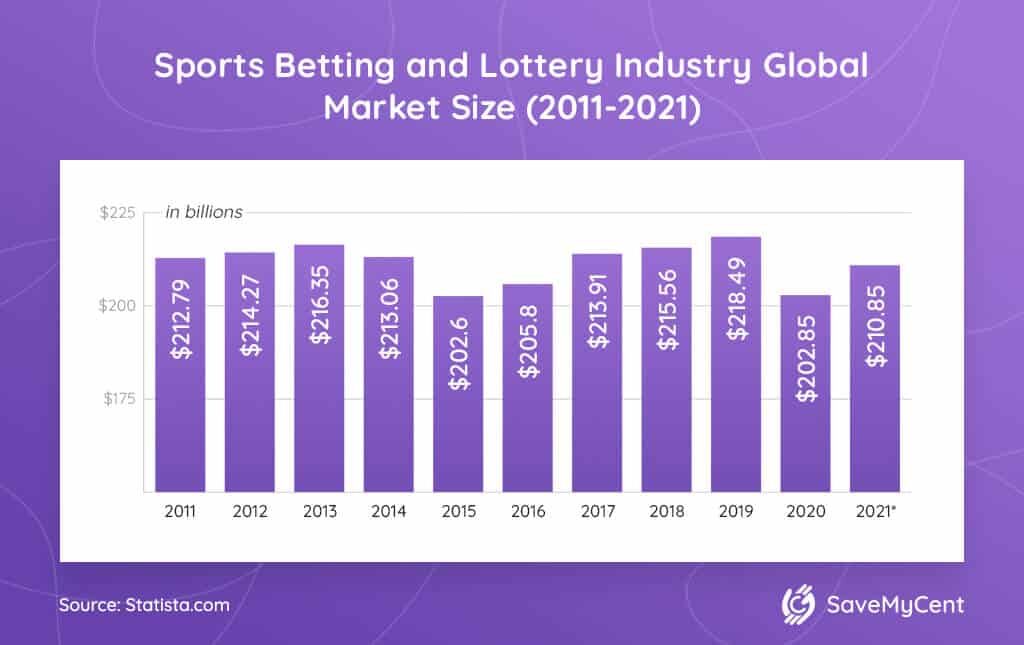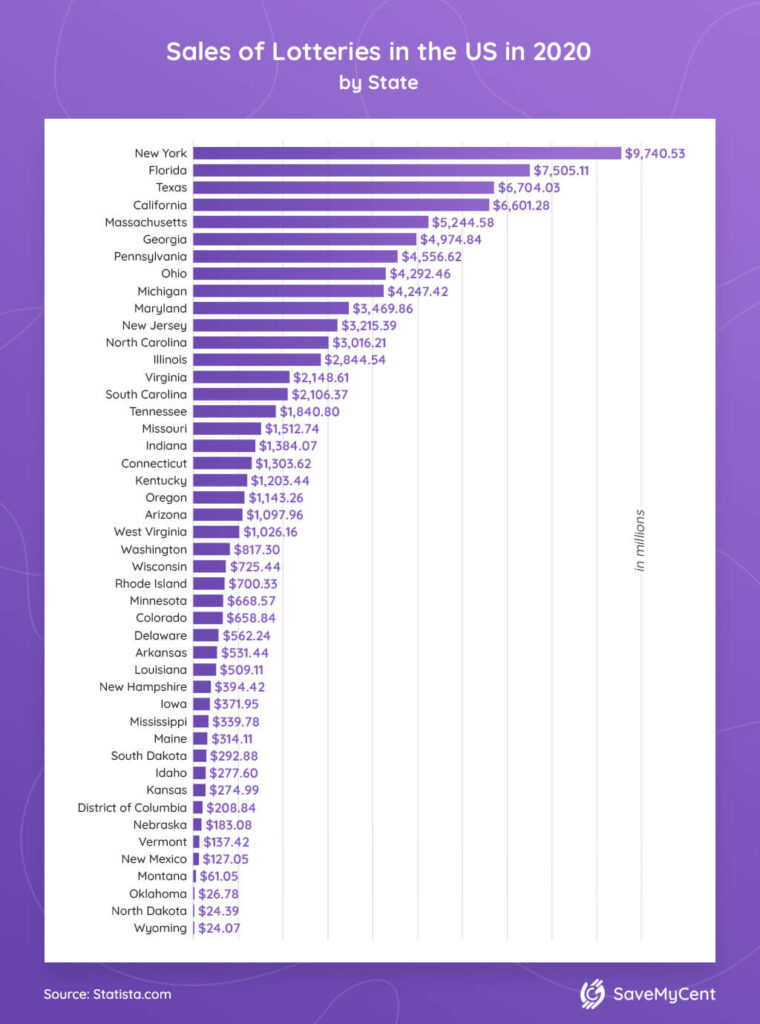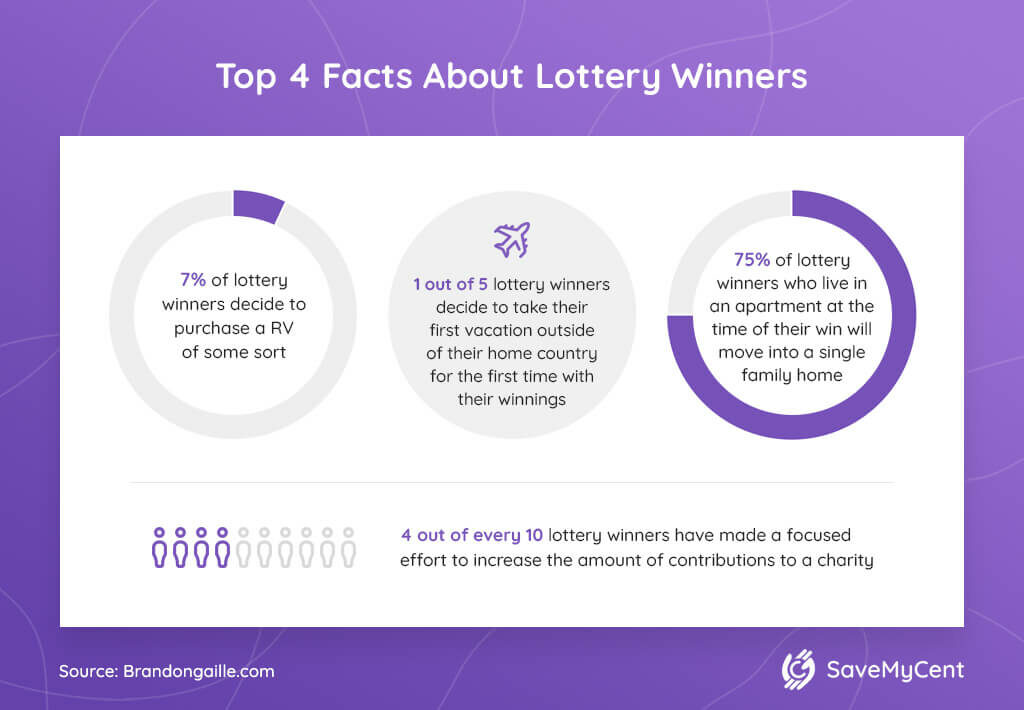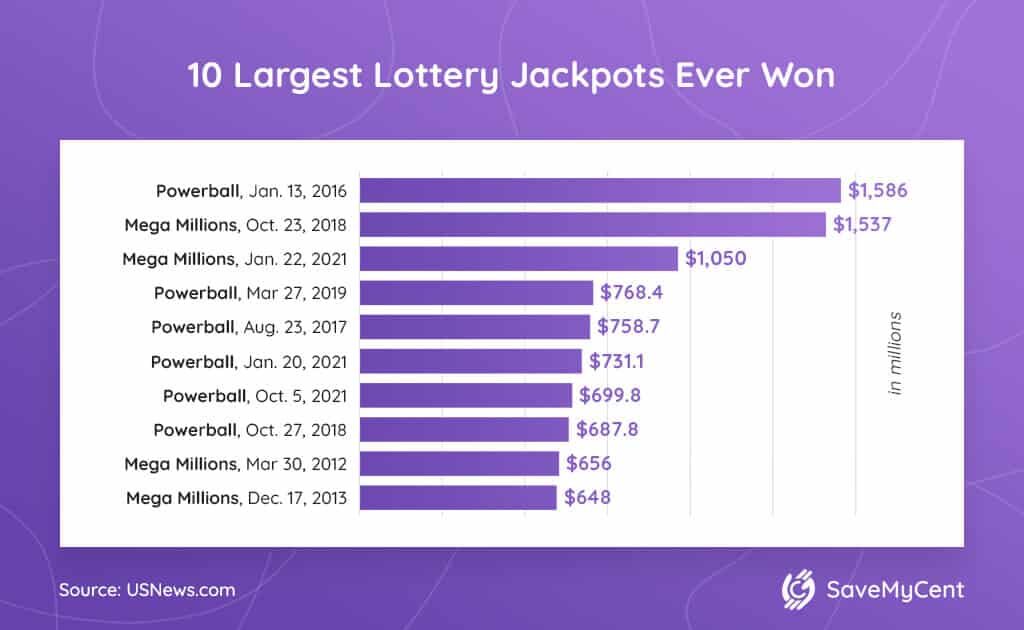The latest lottery industry statistics indicate that the industry is continuously rising. With social media advertising and easily accessible online lotteries, it is becoming significantly easy to purchase a lottery ticket and join in on the fun. In fact, did you know that the average gambler in the United States spends around $261 on lottery tickets and casino games?
To help you learn more about the lottery industry, we have prepared a set of lottery statistics. Furthermore, we also included some interesting and fun details about the lottery winners, how they spent their millions, what percentage squandered it all, and much more.
Most Notable Lottery Industry Statistics (Editor’s Pick)
- New Yorkers spent around $9.7 billion on lottery tickets in 2020.
- The US online lottery industry’s estimated worth is at $2.3 billion.
- Three lucky winners split the $1.586 billion jackpot, which is the highest jackpot ever won in the history of the US lottery.
- The most common Mega Millions number is the number 17.
- The value of the lottery market will increase by $194.14 billion in the next four years.
- The highest online jackpot went to a woman from Panama who won $30 million playing Florida Lotto.
- Roughly 70% of all lottery winners end up broke.
- Approximately $2 billion of lottery winnings go unclaimed in the US every year.
- You can play six different types of lotteries in the US.
Lottery Market Size Statistics
1. Lottery and sports betting had a market share of $210.85 billion in 2021.

Lottery and sports betting market size hasn’t changed much in the past decade. Namely, in 2011, the industry was valued at $212.79 billion, and its highest peak was in 2019 when experts projected the industry was worth around $218.49 billion.
2. The lottery industry statistics show the market is projected to grow by $194.14 billion between 2021 and 2025.
(PR Newswire)
One of the major factors that drive the market is the use of social media to promote the lottery. According to Technavio, the market will continue to rise at a steady CAGR of 9%. Interestingly, the Asia and Pacific region is expected to contribute to 38% of the global market share.
3. The global online lottery market size is expected to reach $14.5 billion by 2026.
(ReportLinker)
Digitalization, technological innovation, and accessibility are just a few reasons the online lottery is rising in popularity. According to the latest data, the global online lottery was worth around $8.7 billion in 2020 and is projected to continue to grow at a CAGR of 8.7%.
4. The US online lottery market was worth $2.3 billion in 2021.
(ReportLinker)
At the time of writing, the US accounts for nearly a quarter (23.7%) of the global online market. One of the fastest-growing regions is Asia-Pacific, and experts forecast it will reach a market size of $4.1 billion by 2026, growing at a CAGR of 10.1%. Other expanding markets include Europe and Canada, growing at a CAGR of 8.2% and 7.2%, respectively.
Lottery Revenue by State
5. The US lottery made nearly $29 billion in revenue in 2019.
(Tax Policy Center)
In 1982, the US made only $1.7 billion in revenue from lotteries, but the number rose to $9 billion just a decade later. In 2007, the US crossed the $20 billion mark for the very first time, and the number continued to gradually increase over the years with only a few minor hiccups.
6. The state of New York made $9.7 billion in lottery ticket sales in 2020.

According to the latest data, Florida is the second-biggest lottery spender, and the state sold $7.5 billion worth of lottery tickets in 2020. Texas follows with $6.7 billion and California with $6.6 billion. The states that spend the least are Wyoming with $24.07 million, North Dakota with $24.39 million, and Oklahoma with $26.78 million.
7. The state of New York has the highest lottery revenue with $3.9 billion.
(Tax Policy Center)
The revenue is calculated by deducting the prizes from ticket sales, and according to the latest data, New York was leading the race in 2019. Other states with a high revenue from lottery sales in 2019 are California with $2.6 billion, Florida with $2.1 billion, Texas with $1.8 billion, and Massachusetts with $1.5 billion.
Lottery Winner Statistics
8. 85% of winners choose to remain anonymous.
(UWorld, CNBC)
Winning a lot of money overnight can change many things and potentially ruin quite a few relationships. For that reason, most lottery winners prefer to remain anonymous. While some states allow you to remain anonymous, a lottery winner from New Hampshire had to go to court to retain her anonymity after winning a $559.7 million Powerball jackpot.
9. Lottery stats reveal that 99% of surveyed winners continue playing the National Lottery even after winning.
(UWorld)
Winning the lottery can certainly change your perspective about the likelihood of winning the jackpot. For that reason, many lottery winners continue to play the lottery even after winning. In fact, around 70% of the surveyed lottery winners reported they were convinced they would win again.
10. Statistics on lottery winners show that 31% of respondents would quit their job if they won the lottery.
(Euro Weekly News)
Out of those who said they would continue working, 66% reported they would stay in the same position while others would look for a different line of work. Older lottery winners would be more likely to retire as 49% of respondents aged 55 or more reported they would quit their job.
In contrast, only 18% of respondents aged between 18 and 34 would quit their jobs after winning the lottery.
11. Ruined friendships is one of the recurring lottery trends for 90% of lottery winners.
(Euro Weekly News, Brandon Gaille)
While some lose friends because of people’s greed, other friendships simply wither away because jackpot winners move. Namely, two out of three lottery winners buy a new home, and every fourth one moves to another country. However, 90% of lottery winners who already had a best friend said their relationship was intact.
12. Approximately 70% of lottery winners end up going broke.
(Brandon Gaille)
According to the latest statistics on lottery winners who went broke, the majority of lottery winners can’t deal with the sudden increase in wealth. In just five years, 44% of them squander all of their fortune and file for bankruptcy.
In fact, around 1% of lottery winners go bankrupt every single year, and those who win at least $50,000 are far more likely to file for bankruptcy within the first five years after winning the prize.
13. Around 55% of lottery winners said they are happier after winning the lottery.
(Brandon Gaille)
However, for a lot of lottery winners, the influx of happiness is only temporary, and their lives quickly return to normal. Namely, 43% reported that money had no effect on their happiness. Interestingly, the latest statistics on lottery winners who went bankrupt show that a small portion of them reported that the new wealth only brought troubles into their lives.
14. Approximately 83% of lottery winners shared their wealth with a family member.
(Brandon Gaille)
Siblings are most likely to receive some cash, closely followed by children and parents. The statistics also reveal that 58% of the lottery winners’ extended families are happier because they could provide financial support to them.
However, it shouldn’t come as a surprise that 37% of people said their families weren’t as happy as before winning the lottery, especially if you take into consideration that the percentage of lottery winners that go broke is relatively high.
15. Four out of ten lottery winners donate considerable amounts to charity.

There are lots of ways to spend jackpot winnings. While some are donating to charity, other lottery winners have different goals. For example, one in five decide to take a vacation for the first time outside of their home country.
Out of those with children, 3% decide to move their kids from a public school to a private one, while 7% of lottery winners decide to buy an RV of some sort.
Entertaining Statistics and Lottery Facts
16. The highest jackpot ever won in the US from the lottery is $1.586 billion.

This occurred in a game of Powerball on January 13, 2016. Surprisingly, there were three winning tickets, meaning that the winners had to share the jackpot. The $1.586 billion prize pool was split evenly three ways and went to the lucky winners who purchased tickets in Tennessee, Florida, and California.
17. The latest facts about the lottery show the highest single-ticket lottery win was $1.537 billion.
(US News)
While the winners of the highest jackpot in US lottery history had to split the jackpot three-way, one lucky lottery player from South Carolina managed to win nearly the same amount all by themselves. The 1.5 billion jackpot was won from Mega Millions on October 23, 2018.
Learn more: How long would it take to spend a billion dollars?
18. Powerball statistics show the odds of winning a Powerball drawing are around 1 in 292.2 million.
(Fox 59)
Did you know that you are more likely to die from an asteroid strike than win the lottery? The odds of that happening are 74,817,414. Additionally, the odds of being struck by lightning are around 1 in 1,101,000. However, you shouldn’t let these stats discourage you because there are plenty of multi-million Powerball winners out there who beat the odds.
19. Number 17 is the most drawn Mega Millions number.
(Lotto Numbers)
Based on the latest lottery facts, the number 17 has been drawn 251 times since 1996, which is just once more than number 31. However, in the past few years, between 2017 and 2021, number 10 is the most drawn number. It was drawn 46 times.
Interestingly, number 17 is right behind number 10, even though it has been more than 70 days since the last time it was drawn. During the same time period, number 17 has been drawn 44 times, and is the second-most drawn number in the past few years.
20. Powerball lottery statistics confirm the number 32 is the most drawn Powerball number.
(Lotto Numbers)
The number 32 was drawn 307 times, ever since the first Powerball drawing in 1992. It is closely followed by the number 26, which was drawn 305 times. The number 32 is also the most frequently drawn number between 2015 and 2021 and was drawn 65 times, which is two times more than the second-highest number in the same period, number 23.
21. Numbers 72 and 65 are the least common Powerball and Mega Millions numbers.
(Lotto Numbers)
Based on the latest lottery ticket statistics, the number 65 is the least drawn Powerball number. In case you are superstitious, or you simply want to use data to your advantage, you should know that the least drawn Mega Millions number is the number 72. It has been drawn only 20 times since 1996.
22. Americans don’t claim $2 billion of lottery winnings every single year.
(Euro Weekly News)
A big portion of these unclaimed wins comes from a lot of small wins when players either don’t bother to collect the prize, miss the deadline, or simply lose the winning ticket. However, there have been cases where players missed the opportunity to claim millions of dollars.
For example, the latest state lottery data reveals that a Powerball ticket purchased in Georgia went unclaimed in 2011. The ticket was worth $77 million. However, the biggest unclaimed jackpot happened in EuroMillions in 20210, when the winners didn’t claim the jackpot worth $87 million.
23. A woman from Panama won $30 million playing Florida Lotto.
(theLotter)
In today’s time, you don’t even have to leave the comfort of your home to play the lottery. In fact, you don’t even have to be a resident of a specific country to play it’s lottery, which was the case for one lucky woman from Panama. Based on the latest online lottery winners statistics from theLotter, she managed to win a whopping $30 million by playing the Florida Lotto.
Other notable players who tried their luck with other nation’s lotteries and won include a man from Iraq who won $6.4 million playing Oregon Megabucks and numerous other winners who won playing everything from US Mega Millions and US Powerball to EuroMillions.
24. There are six different lottery types in the USA.
(Playport)
These include standard Lotto, Powerball, daily lottery, Little Lotto, scratch cards, and multi-state games. However, an important thing to know is that each state regulates its own lottery. Therefore, the availability varies from one state to another.
As far as popularity goes, the most sought-after lotteries are Powerball and Mega Millions. Both of these lotteries are multi-jurisdictional lottery games. Because of that, they often offer life-changing jackpots with hundreds of millions in prize pools.
What Can We Take From These Lottery Statistics?
As you can see from the numbers, the lottery industry is not going anywhere any time soon. In fact, it is quite the opposite, since this lucrative market is only growing in popularity. One of the biggest reasons the lottery remains a fan favorite is because it hasn’t changed since the olden days.
The rules are quite straightforward, the tickets are cheap, and the potential rewards are jaw-dropping. Granted, while the latest lottery industry trends like online play make the game even more popular and accessible than ever, the essence of the game remains the same.
Even though the chances of winning the lottery are slim, virtually all of us daydreamed at one point or another about winning the jackpot. Therefore, it shouldn’t really come as a surprise that millions of people regularly test their luck playing the lottery.
If you happen to be one of them, and you also happen to win the jackpot by some miracle, try your best not to spend all your money on vices and sketchy investments.
After all, if there’s anything you should take with you from our lottery industry statistics, it is the fact that a lot of lottery winners end up being broke. Millions of dollars might sound like a lot of money, but you can burn through it rather fast by purchasing cars, houses, or even partying. Instead of following the same path as some of the jackpot winners, try to remember that the best way to save your cent is to spend the money rationally and plan for the future.
Frequently Asked Questions | FAQ
What is the lottery industry worth?
Based on the latest data available, it is projected that the lottery industry combined with sports betting was worth around $210.85 billion in 2021. However, the lottery industry alone is expected to grow by as much as $194 billion between 2021 and 2025.
When it comes to the online lottery, the industry was estimated at $8.7 billion in 2020, and it is projected to rise to $14.5 billion by 2026.
How many states have a lottery?
In the US, 45 states have a lottery. Moreover, the lottery is also run by the District of Columbia, Puerto Rico, and the US Virgin Islands. Each state has its own rules and regulations for running the lottery.
However, some states run multi-jurisdictional lotteries, like MegaMillions and Powerball, that always reach the highest jackpots, making them the most popular lottery types among Americans.
Where does the lottery money come from?
The lottery money comes from the players who purchase lottery tickets, and the money is added to the prize pool. The money is then distributed to the winners and companies that sold the tickets to the winners, administrative costs and expenses of running the game, and to the states that sold the tickets, in case it’s a multi-jurisdictional lottery.
The states can then decide how to allocate the revenue from the lotteries, which often goes into a general fund to address communal areas, educational systems, and such.
How many people have won the lottery?
It’s safe to say that hundreds of thousands of people have managed to win the lottery so far. Of course, not everyone wins the same amount. While most players have managed only to win smaller sums, a few lucky players managed to win jackpots and have pocketed millions of dollars.
For example, in the UK, more than 6,300 people became millionaires by playing the National Lottery. As far as the US is concerned, some of the largest jackpot wins include $1.586 billion from a Powerball ticket in 2016, $1.537 in 2018, and a $1.05 billion jackpot from Mega Millions in January 2021.
How many lottery tickets are sold each year?
According to the latest lottery industry statistics from Statista, all states combined sold nearly $90 billion worth of lottery tickets in 2020. Since the cost of a lottery ticket in the US is $1 or $2 for Powerball ($3 with the Power Play option), we can determine that Americans bought around 45 billion lottery tickets in 2020, if not even more.
Before you go, check out where you can buy lottery tickets. Good luck!
Sources:







![How to Get Free Clothes From Shein? [2024 Guide]](https://savemycent.com/wp-content/uploads/2023/09/How-to-Get-Free-Clothes-From-Shein-336x220.png)
